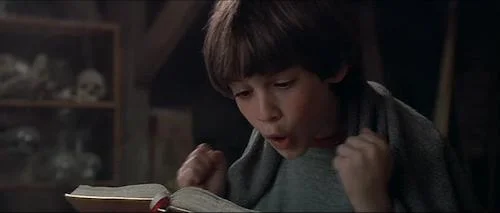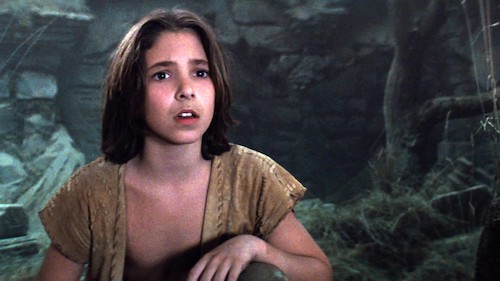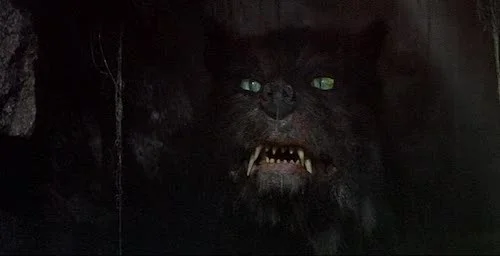National Kids Day: The NeverEnding Story
As part of National Kids & Pets Day, we decided finding nostalgic childhood films was a bit easier than combining both themes. We are taking this opportunity to review ten films that have been deemed staples of the youths of varying generations. This article looks at The NeverEnding Story.
Look, a number of things haven’t aged all that well. Why does Mr. Coreander only care about Bastian being bullied once he discovers he loves books? Would Bastian’s well being not matter if he was actually into video games? I get that Coreander is upset that books are being replaced, but that doesn’t justify his hostile reaction to a kid that is clearly in need.
Now that we got that out of the way, The NeverEnding Story is a childhood staple for many millennials, because it goes the extra mile. So what if Falkor doesn’t look all that convincing in 2019. We have many other creatures that still are either somewhat impressive (the Rock Biter), or are quite outstanding, considering when they were made (Gmork). The fact is the film tried. The world of Fantasia. The parallels between Bastian’s life and Atreyu’s quest. There are some clear efforts here, that separate this film from many of its peers.
Bastian taking part in Fantasia’s existence by reading.
The premise is smart enough to make up for some of the other plot holes. Bastian can help the world of Fantasia live by reading and keeping it alive. An abstract concept known as the “Nothing” is destroying everything. Just like a debate can be made over sound existing if no one is around to hear a tree fall, this film begs the question: do characters exist without a curious mind to conjure up a depiction of literature? The Nothing is the void of a reader. The words are half the experience of reading: the brain as a receptacle is the real magic. Bastian knows this, but is unsure of how powerful his participation is until Fantasia is all but dregs.
How has no one come looking for Bastian this entire time? Does he actually come riding through the city on the back of a luck dragon, like he’s a rebel without a cause? Does his responsibility end up relating to the kind his father was trying to instil in him at the beginning of the film? These are pressing issues that do make The NeverEnding Story feel incomplete (and don’t give me that “but it’s never-ending excuse). What could have been a near perfect childhood classic ends up being slightly dismissive. I love that we get so engaged with Fantasia that the real world vanishes, but it doesn’t have to literally vanish.
Atreyu: the young warrior sent on the quest to save the troubled empress.
Fortunately, there are enough strong elements to make this film a trip for all young generations to come. The gorgeous score by Klaus Doldinger and Giorgio Moroder may very well be one of the strongest of any family film: a synthetic mist that flourishes in times of joy, and claws during turmoils. All of the characters were given fine attentions to detail; enough so that even the less convincing animatronics are still loveable. The cinematography by Jost Vacano is almost too good: some of the film’s scenes are artistic enough to make The NeverEnding Story a slight gateway film to something a little more critical for young viewers.
All of this is in line with the film’s more pressing topics; The NeverEnding Story remains one of the more heavy family films to this day. Artax (Atreyu’s horse) experiencing depression strong enough to kill him in the Swamps of Sadness is an early gut punch. The Rock Biter acknowledging his hands as destructive — yet not strong enough to save his friends from the Nothing — is another tear jerking moment. Even though the film doesn’t relay back to Bastian’s real life as much as it should (and I don’t include cuts to Bastian reacting to the book as real life ongoing matters), I do appreciate how unforced the book’s parallels are. Bastian’s mom recently passed away. There was nothing he could do to stop her from going. He finds it difficult to move on. Fantasia is driven by Bastian’s life. This is why more focus on the real world around him would have sufficed, As for Fantasia, it feels just about right.
Gmork: a villainous canine that stands as one of the finer animatronics in the film.
There are a lot of mature topics here that I feel are presented really intelligently. Nothing is sugar coated, but kids won’t be scarred for life, either (hopefully). The NeverEnding Story never jumps-the-gun to discuss suicide, even though Artax can clearly resemble that notion. These are images shown to children that will clearly cause a reaction, but dark social issues are not being taught to young viewers as much as difficult ideas are being handed. The film may be best to watch with an actual guardian to help answer some pressing questions children may have.
As a nostalgic revisit from an adult, The NeverEnding Story should be okay. You might find some unsatisfactory plot threads, but the return to Fantasia will be as glorious as you remember. For a family film, The NeverEnding Story is striking, engaging, thoughtful, and highly intelligent. Just an extra ten minutes or so of tidying up would have made this one an actual cinematic staple for family films; for now, it remains a bold effort that continues to demand an audience (old and young) thirty five years later.
Andreas Babiolakis has a Masters degree in Film and Photography Preservation and Collections management from Ryerson University, as well as a Bachelors degree in Cinema Studies from York University. His favourite times of year are the Criterion Collection flash sales and the annual Toronto International Film Festival.







